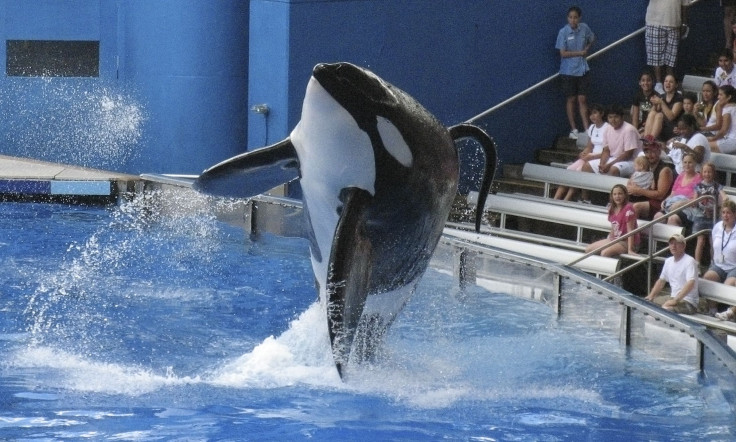SeaWorld Fights To Put Trainers Back In The Water With Killer Whales

The future of SeaWorld Entertainment’s (NYSE:SEAS) famed killer whale show will be on the line Tuesday when the theme park operator pleads its case to the U.S. Court of Appeals that trainers should be allowed to perform alongside the giant predators once again.
The Orlando-based company, which has marine parks in Florida, California and Texas, hopes to overturn a safety citation and federal ban on “close contact” between the whales and their keepers. SeaWorld claims a Labor Department judge went too far by prohibiting the content of its signature attraction.
The suit stems from the 2010 death of 40-year-old SeaWorld Orlando trainer Dawn Brancheau, who was yanked from a platform and thrashed around in a pool by a 12,000-pound whale named Tilikum who performed in the popular “Dine with Shamu” show. The incident played out in front of a horrified crowd, and it took fellow trainers 45 minutes to coax the whale, the resort’s largest, into letting go of Brancheau’s body.
Soon after the veteran SeaWorld employee’s death, it came to light that Tilikum was not the innocent and confused creature Seaworld had made him out to be. The killer whale was linked to at least two other deaths, one of which occurred at SeaWorld Orlando, where a man who snuck into the park after closing was found dead the next morning draped over Tilikum’s back.
The other incident took place at Sealand of the Pacific in Victoria, Canada, and also involved a trainer who was dragged underwater and drowned. Sealand of the Pacific closed soon after, and Tilikum found a new home in Orlando.
An investigation into Brancheau’s death by the Labor Department’s Occupational Safety and Health Administration, or OSHA, found that SeaWorld “willfully” violated federal safety laws requiring a workplace to be free from recognizable hazards. The park operator received a $75,000 fine and three citations.
When SeaWorld appealed that decision last year, Administrative Law Judge Ken Welsch reduced the fine to $12,000 and downgraded the “willful” complaint to “serious.” Welsch did, however, side with OSHA’s findings that keeping trainers out of the water with killer whales (unless there is a barrier) would reduce the risk of serious injury and death. The judge said that the “emotions inspired by the grandeur of humans interacting with killer whales” did not outweigh the hazards.
That’s the argument that's up for debate yet again Tuesday when Eugene Scalia, son of Supreme Court Justice Antonin Scalia, is expected to argue that SeaWorld’s viability as an operation is on the line unless it can offer death-defying stunts involving human-whale interaction. In court papers, the company likened the current restrictions to requiring speed limits in NASCAR or forbidding tackling in the National Football League.
SeaWorld also noted in the court documents that observing its shows “brings profound public educational benefit, is integral to SeaWorld's care of the whales, and responds to an elemental human desire to know, understand and interact with the natural world." It added that close contact with the killer whales “is essential to the product offered by SeaWorld, and is indeed the primary reason trainers and audiences have been drawn to SeaWorld for nearly 50 years.”
OSHA counters that visitor numbers attest to how the resort is doing just fine without the kind of contact that has resulted in the deaths of at least three trainers. The agency notes that SeaWorld already has a new successful killer whale show, “One Ocean,” that does not incorporate water work.
Beyond the impending court case, it has already been a damaging year for SeaWorld’s reputation. Tilikum was the subject of a documentary film called “Blackfish,” which premiered at Sundance Film Festival in Janurary and is highly critical of SeaWorld’s treatment of killer whales. The film grossed more than $2 million in the U.S. over the summer and aired subsequently on CNN.
© Copyright IBTimes 2024. All rights reserved.






















